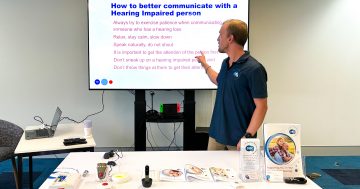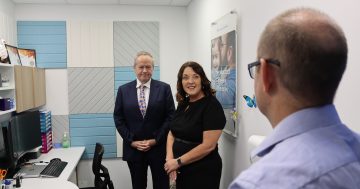
Hearing loss doesn’t necessarily need to impact your ability to connect with the people you love. Photo: File.
As Australia’s population ages, the number of people with a hearing impairment is expected to double by 2060.
But the issue isn’t confined to the elderly. As it stands, about 3.6 million people have some hearing loss ranging from mild to complete.
Hearing loss technology has come along in leaps and bounds over the years, catering to the entire spectrum and for several specific scenarios and environments.
Yet according to ACT Deafness Resource Centre communications office Joe Symons, there is a disparity between these facts and the number of people accessing available resources.
He says from education to employment and our overall wellbeing, hearing loss can impact life in fundamental ways.
“Things like missing out on milestones with the grandkids or social occasions can lead to feelings of isolation, loneliness and disconnection from the world,” he says.
“This in turn can impact our mental health and even our physical health. For example, hearing loss is associated with high levels of depression, memory loss and even dementia.”
Hearing loss is commonly associated with age, but other factors include exposure to loud noise, untreated ear diseases and genetics.
Having been born with moderate to severe hearing loss, Joe has grown up exposed to a range of devices – but he says for those who experience hearing loss later in life, or sudden loss of hearing, hearing aids can be a confronting prospect.
“It’s a massive adjustment,” he says.
“For starters, you can’t pop the hearing aid in and expect to instantly hear things as before. For most people, there’s an adjustment period where the brain recalibrates. Your brain is learning to hear again, starting from square one.
“Generally after a week or two, the brain adapts to processing these new sounds and you become comfortable.”
Joe says for new hearing aid users, the sounds can be overwhelming at first and even fatiguing.
“At a talk I recently gave at a retirement village I met a woman who had decided she preferred the impost of her hearing loss and had stopped using her hearing aids,” he says.
“She didn’t realise that with consistent use, her experience of her hearing aids would change.”

ACT Deafness Resource Centre communications officer Joe Symons. Photo: ACT Deafness Resource Centre.
Joe says it’s important to know when to step out of loud environments or take a break and remove a hearing aid – but overall perseverance is critical. One thing that can assist is goal-setting.
“It could be that you want to hear your grandchild’s concert, or just be able to go out and enjoy drinks with your mates and carry on a conversation in public settings,” he says.
“Whatever your goal, you’ll only give your brain that chance to really adapt if you stay consistent with your usage.”
Reluctance aside, Joe says some people can become gradually accustomed to a lower baseline of hearing ability and perhaps don’t realise it’s behind many of the day-to-day issues they experience.
“Ask yourself ‘am I very often asking people to repeat themselves? Am I having difficulty following conversations when there is background noise? Do I find certain frequencies or sounds – like the doorbell or the phone – difficult to hear? Is it harder for me to hear children or people on the phone? Are people always telling me that the volume on my television is too high?'” he says.
“These are all markers we can easily dismiss.”
While old-school hearing aids were quite conspicuous, today’s latest technology is less cosmetically concerning, more effective and offers more options.
“With mild hearing loss you can opt for a personal amplifier. It’s a piece of assistive tech that’s perfect for when your hearing loss has started to deteriorate but you’re not quite ready for hearing aids yet,” Joe explains.
“They’re around the $400 price point so can be a cost-effective means of communication.
“Devices can also have multiple uses – like plugging directly into the tele if that’s causing problems.”
Hearing aids can also be programmed to address a range of specific environments and scenarios, such as loud environments, music or even strolling side by side with a friend.
Technology aside, the ACT Deafness Resource Centre offers a range of services, such as informative talks, support groups and consultations, to assist people experiencing hearing loss.
“Hearing loss is largely an invisible disability,” Joe says.
“We’re here to help people affected by hearing loss be seen and heard on their hearing loss journeys.”
Contact the ACT Deafness Resource Centre to learn about your options or book a no-cost, obligation-free consultation.





















